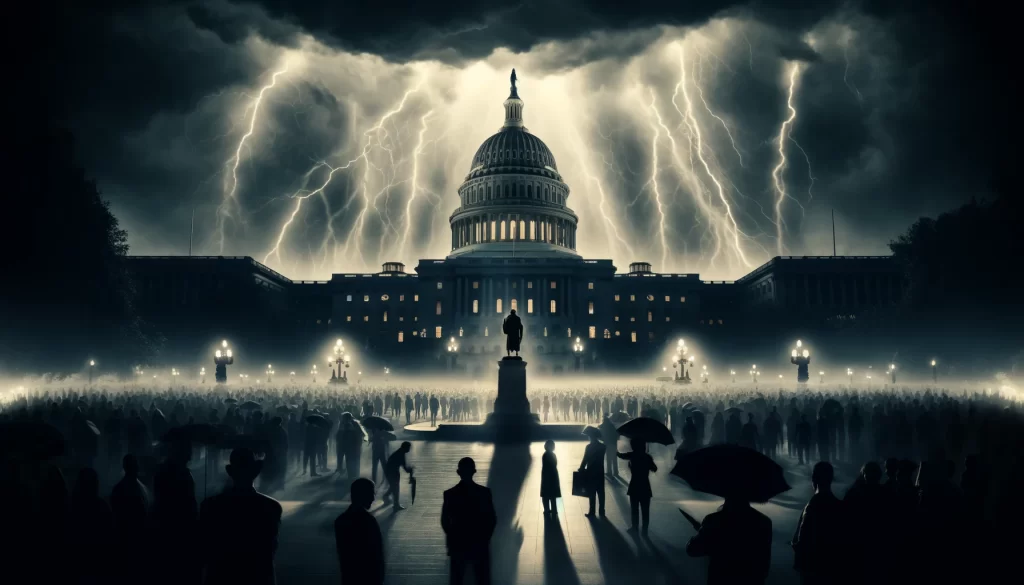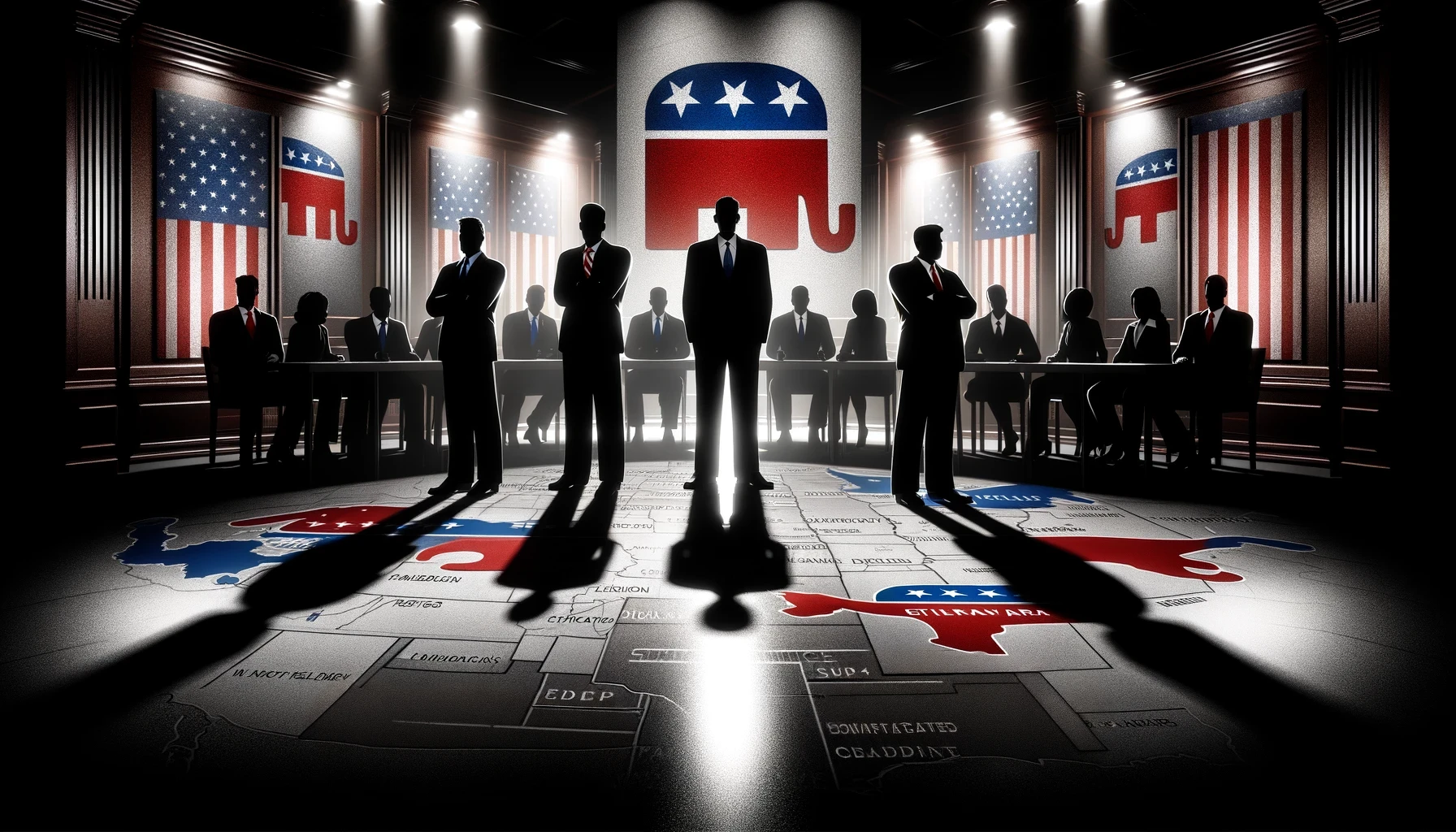As the presidential election approaches, fewer than six months away, key members of the Republican Party have not committed to accepting the results if they do not win. This stance echoes the actions and sentiments of former President Donald Trump and suggests the possibility of contesting the election outcome, much like in the previous election cycle.
Several Republican leaders and potential vice-presidential candidates for Trump have avoided giving straightforward answers about whether they would accept the election results. Their responses range from avoiding the question entirely to making statements that are not based on fact. This change in attitude marks a shift from previous political norms where agreeing to accept the election results was a given and rarely questioned.
The reluctance to commit to accepting election outcomes can be traced back to the 2020 election, when Trump, upon losing, did not concede. His persistent claims of an unfair election have influenced other Republicans to adopt a similar stance well before any votes are cast in the upcoming election.
Donald Trump has expressed that he will respect the results of a “fair” election. However, he has also preemptively deemed the upcoming election as unfair, describing the federal and state legal charges against him as “election interference.” He has not dismissed the possibility of unrest similar to previous election-related violence from his supporters, stating, “If we don’t win, you know, it depends,” and elaborated, “It always depends on the fairness of an election.”
When confronted with Trump’s statements, Senator Tim Scott of South Carolina, a potential running mate for Trump, sidestepped the question repeatedly during an NBC’s “Meet the Press” interview. Despite his previous stance during a Republican presidential primary debate in August, where he affirmed, “Absolutely, he did the right thing,” referring to former Vice President Mike Pence’s decision to certify the 2020 election results, Scott dodged the question about accepting future election outcomes. After numerous attempts by the moderator, Kristen Welker, to get a definitive answer, Scott concluded, “I’m not going to answer your hypothetical question.”

House Speaker Mike Johnson also commented on the issue through a spokesperson, who stated, “The speaker of the House has a duty to ensure each presidential election is conducted in compliance with the Constitution and all applicable laws, and to accept the results accordingly,” adding, “Speaker Johnson will always adhere to the rule of law. The speaker also recognizes the right of all candidates to contest election irregularities with litigation as appropriate.” Johnson has shown support for challenging the results under certain conditions, as evidenced by his past actions and statements.
Representative Elise Stefanik, another key figure and potential Trump running mate, has said she will accept the results “if they’re constitutional.” She labeled the 2020 results as unconstitutional due to changes in voting procedures that she believes bypassed state legislatures, stating, “What we saw in 2020 was unconstitutional circumventing of the Constitution, not going through state legislators when it comes to changing election law.”
Byron Donalds, a Florida Republican and also a potential vice-presidential candidate, offered his conditions for accepting future election results, saying, “As long as localities actually follow election laws passed by the legislature, yeah,” indicating his concerns stem from perceived irregularities in the 2020 election process.
Senator J.D. Vance, while not directly responding to inquiries about the 2024 election, has previously stated his stance on the matter. He criticized Vice President Mike Pence’s actions in 2020 and said, “If I had been vice president, I would have told the states — like Pennsylvania, Georgia and so many others — that we needed to have multiple slates of electors, and I think the U.S. Congress should have fought over it from there.”
Lastly, Sam Brown, a Senate candidate in Nevada, avoided direct answers to a questionnaire about election fraud and acceptance of the results. He expressed general concerns about election security, citing legislative changes in 2020 by Democratic lawmakers as problematic: “These last-minute changes caused many voters to lose confidence in our election systems.”
This article is based on the following article:
https://www.nytimes.com/2024/05/11/us/politics/republicans-election-denial.html

Background Information
Understanding these elements provides a foundation for comprehending the complexities of the article, which discusses how certain political figures and potential candidates for the upcoming presidential election are positioning themselves regarding the acceptance of future election results.
1. U.S. Presidential Elections:
In the United States, the President and Vice President are not elected directly by voters but through a system called the Electoral College. Each state, plus Washington, D.C., has a certain number of electoral votes based on its representation in Congress: one for each member in the House of Representatives plus two for the Senators. To win the presidency, a candidate must receive a majority of the electoral votes, which is currently 270 out of 538.
2. Election Certification:
After a presidential election, the results in each state need to be certified. This means that the state has officially confirmed the counts and declared the winner of its electoral votes. The certification process is crucial as it precedes the meeting of the Electoral College, where electors formally cast their votes for President and Vice President. The results from each state are then sent to Congress, which meets in a joint session in early January to count the electoral votes and officially declare the winner.
3. Role of the Vice President in Election Certification:
The Vice President of the United States serves as the President of the Senate and has a ceremonial role during the joint session of Congress to count the Electoral College votes. Historically, this role does not include the power to change or reject the results, but rather to oversee the process of opening and counting the votes submitted by each state’s electors.
4. Challenges and Disputes in Elections:
It is not uncommon for there to be disputes over election results, where one party may challenge the legitimacy of the outcome due to alleged irregularities or violations of election laws. Typically, these challenges are resolved through the courts or through state election certification processes. A notable part of the 2020 election was the numerous lawsuits filed contesting the results, most of which were dismissed due to lack of evidence.
5. Political Context of the 2020 Election and Its Aftermath:
The 2020 presidential election was highly contentious, culminating in widespread claims of electoral fraud by former President Donald Trump and many of his supporters, though these claims were largely unsubstantiated and dismissed in courts across the country. Following the election, there was significant tension, including a riot at the U.S. Capitol on January 6, 2021, when Congress was in session to certify the election results. This event underscored deep divisions in the country and has had lasting impacts on political discourse.
6. Electoral Count Act:
In response to the 2020 election disputes and the January 6 Capitol riot, Congress passed an update to the Electoral Count Act. This law clarifies the procedures for the electoral vote count in Congress and limits the role of the Vice President, aiming to prevent future disputes and ensure a smoother transition of power.

Debate/Essay Questions
- Should political candidates always commit to accepting election results, or is it reasonable for them to withhold commitment until the fairness of the election is verified?
- How does the refusal to accept election results impact the democratic process?
Please subscribe to Insight Fortnight, our biweekly newsletter!
